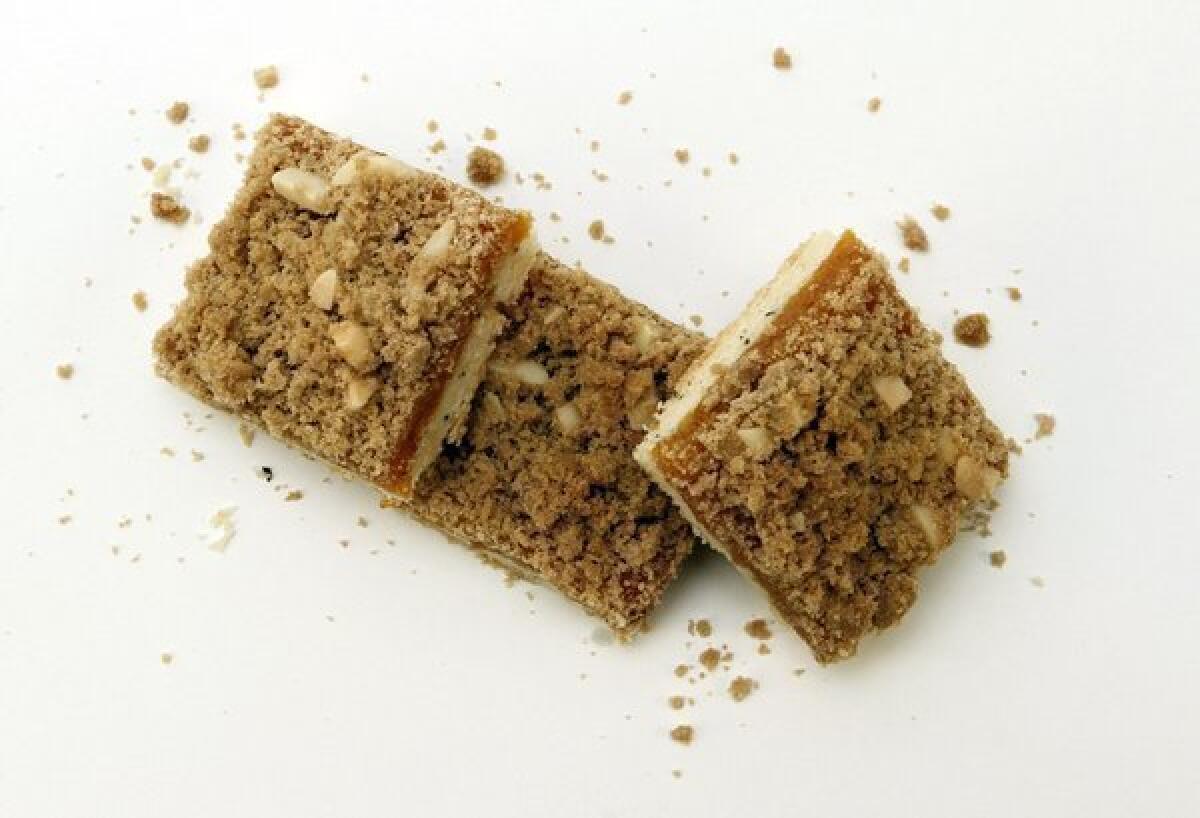The complicated case of the simple cookie

- Share via
Where do recipes come from, and who has the right to claim them? As a professional writer of recipes for almost 30 years, that’s something I think about a lot. And I was thinking about it again this weekend after a couple of readers took issue with one of the winners in our third annual Los Angeles Times Holiday Cookie Bake-Off.
The recipe in question was for the rosemary apricot bars submitted by Kelli Abrahamian, and it provides a really good example of just how complicated what might seem like a simple question can be.
A couple of readers emailed Test Kitchen manager Noelle Carter and me saying that the recipe had been lifted from popular food blogger and cookbook writer David Lebovitz. But when I contacted Lebovitz, the story became slightly more complicated, because he’d taken the recipe from somewhere else -- a cookbook called “Baked Explorations” by Matt Lewis and Renato Poliafito (giving them full credit, of course).
And then came an email from Abrahamian, who seemed quite embarrassed about the whole kerfuffle. It turns out that she’d first run the recipe on her own blog in August 2011, and had credited both Lebovitz and Lewis and Poliafito.
We’re running a clarification in this week’s Saturday section, but it all made me wonder “where do recipes come from, anyway?” That’s particularly true of cookies, which are fairly exact combinations of a very few ingredients. And even more so with holiday cookies, which are, after all, celebrations of tradition. Who made the first sugar cookie? Or Mexican wedding cookie? Something like a rosemary-apricot bar is more specific, but how far back do you have to go in crediting it?
A couple of things for the record: Our bake-off is intended as a kind of exchange, with good cooks sharing recipes for their favorite cookies, not as a competition for food inventors. Ideally, the originators of the cookies (if known) are credited, but originality is not required and it certainly is not the basis for judging.
Also, at The Times, we try to follow three levels of attribution for our recipes. All recipes that we get from other sources are credited. Most are attributed with “adapted from,” because almost every recipe we run has been changed, even if only slightly, either in testing or copy-editing (this also protects the writer from any errors we might have introduced in the process).
Sometimes in either the developing of a recipe, or in our testing process, we change a recipe more dramatically. In that case, depending on the specifics of the situation, we might go with “adapted from” or we might think it’s better to write “based on a recipe from.”
And sometimes, someone else’s recipe might simply give us an idea for a dish of our own -- maybe it’s a particular pairing of flavors, or a technique that we’ve adapted in a very different way. In those cases, we’ll usually write something like “inspired by” or “based on an idea from.”
As we’re reminded from time to time, that system doesn’t eliminate every single problem, but it does keep them to a minimum.
ALSO:
‘Next Iron Chef’ recap: Bacon buffet? No way!
New Barbershop Ristorante Italiano pop-up at A.O.C.
More to Read
Eat your way across L.A.
Get our weekly Tasting Notes newsletter for reviews, news and more.
You may occasionally receive promotional content from the Los Angeles Times.











